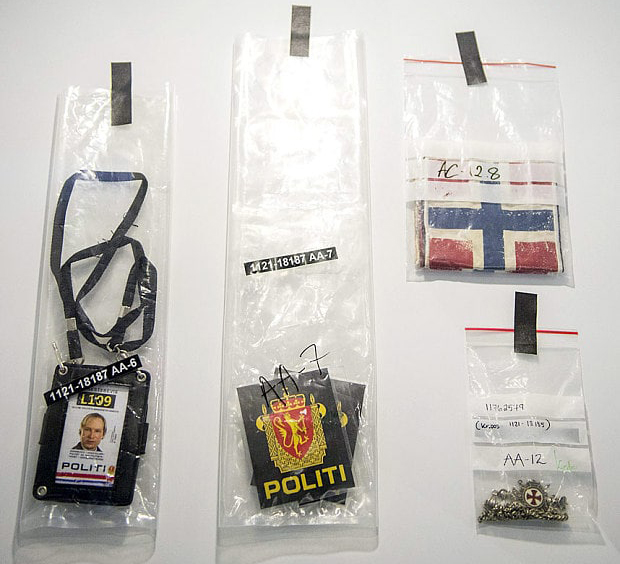Sixth anniversary of Norway attacks
Robert McAlister, CRJ Editorial Panel Member, is in Oslo to attend the Sixth Anniversary of the July 22, 2011 Norway attack by Anders Behring Breivik.

Fake police identification recovered from far right extremist Breivik after his arrest (author image)
Hosted by RVTS East (Regional Office for Violence, Trauma and Suicide) Robert, while in Oslo, will continue the development of the new RVTS Crisis Leadership Academy he co-designed to create crisis leaders of the future which opens in December.
Six years ago this Saturday, the far right extremist initially killed eight in car bomb near the government quarter in Oslo. Two hours later, masquerading as a police officer, he massacred 69 students on Utoya Island.

McAlister is staying at the hotel that was used as the Family Assistance Centre after the July 22, 2011 attack
It is timely and poignant to remember his self-proclaimed motives were to highlight the 'Muslim Invasion' and the failings of multiculturalism in Europe, especially against the current backdrop of an unsettled turbulent Europe and anti- migrant sentiment.
Since the Norway attack, there has been a significant rise is far right extremism around the world. The profile of this reached a peak with the killing of the UK MP Joe Cox by Thomas Mair in 2016 and again this year by Darren Osborne when he ran over Muslim worshippers outside Finsbury Park Mosque killing one person and injuring 11 others.
Recently The Independent newspaper in the UK quoted the following:“Official statistics show that 91 out of a total 260 people held on suspicion of terrorism offences were white – a rise of 20 from 2015 and the highest number since 2003.”
White suspects made up 35 per cent – or one in three – of all terror related arrests in 2016, compared with 25 per cent in 2015.
The frequency of far-right attacks is particularly significant in the United States, where white supremacist, anti-government and neo-Nazi extremists have been responsible for 73 per cent of deadly terrorist attacks since September 11, 2001, according to the Government Accountability Office. Also notable is that in many cases, Muslims have become the target of violence.
The potential for further attacks around the world are highly likely, but while most people's eyes are firmly on Islamic Extremism owing to recent high-profile attacks in Manchester, London, Stockholm and elsewhere, this under-reported threat could be the one that catches us most by surprise.
Having spent the last year working with Norwegian colleagues on various projects, I have come to realise just how devastating the Norway attack was for individuals, as well as the nation as a whole. It is widely estimated that one in four Norwegians knew someone affected by the attack.
It is important to note this was a home-grown attacker and one of the first lone wolf style threats that the world’s security services now fear, in a highly planned and co-ordinated style attack. Thus its impact was unprecedented.
Lessons that came from the inevitable post attack review, eventually focussed on two major areas of weakness in the response phase, namely decision-making and communication.
I have spent time reviewing the report and working with several Norwegian agencies, and the important sense making of joining the dots (situational awareness) and critical thinking elements appear to have failed, coupled with cross-cutting organisational structures and communications issues among emergency responders.
It is these common areas of weakness in crisis leadership that the Crisis Leadership Academy aims to remedy and strengthen among participants.
Situational awareness, critical thinking and communication are the core themes, concentrating on important but neglected, advanced soft skills, including leadership EQ skills, performing under pressure and psychosocial tools.
The syllabus is blended to create leaders who well are rounded and effective in a multi agency environment and most importantly team and individual performance focussed in crises.
Thumbnail image: Robert Maldeno/Flickr/CC
Robert McAlister, 20/07/2017